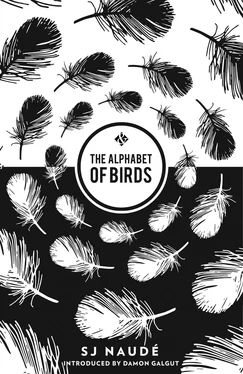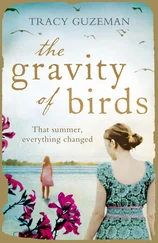‘Why not?’ says Dr Kgope, sounding weary of this kind of conversation. ‘It is where I am most needed.’ She takes a sip of tea. ‘It would be more interesting to know what brings you here.’
Dr Kgope’s cup tinkles in the saucer. Thick-rimmed porcelain cups, like in a teachers’ common room.
‘Why not?’ Sandrien smiles. ‘By the way, how did it happen that the training college here has such extensive facilities?’
‘It was originally designed as a teachers’ college,’ says Dr Kgope. ‘Everyone knew that all the teachers’ colleges would be closed shortly, but the place was built nevertheless. It stood empty for a few years.’
‘But why?’
Dr Kgope rubs her thumb over her forefinger like a cashier counting money.
‘Bribes?’
‘Draw your own conclusions.’
Dr Shirley Kgope bends down to straighten the lines down the back of her silk stockings. Tea time is over. They pick their way through goats on the veranda to get to the seminar room.
‘We should tell Mr Mabunda to fix the fence,’ says Dr Kgope, kicking goat droppings from the tiles.
‘Why are you here?’ Mrs Nyathi asks with sly, amused eyes when the two of them are drinking brandy alone late that evening.
The three other girls who are boarding at Bella Gardens, all nurses and fellow students, are out somewhere, probably in the shebeen further down in the village. Mrs Nyathi is small with a broad face, substantial thighs and cheeks across which baby skin is stretched beautifully taut. Tonight she is smoking a cigar. Like two gents in a members’ club they sit in deep armchairs.
‘You’re not the first to ask,’ answers Sandrien. ‘For the training, of course!’
Mrs Nyathi shakes her head. ‘No, no, I mean why are you here?’
She gestures with both hands towards Sandrien’s body. Towards her skin colour, in fact.
Sandrien sits back in the armchair. Two months ago, she had returned home to the farm at Dorrebult, her palate shredded by chemotherapy. She had spent three months in Bloemfontein. She stayed on her own in a guest house, within walking distance of the hospital. Her identical twin daughters sometimes came to sit with her in the afternoons after school, but she usually felt terrible and the two surly adolescents had little to say to her. On the first afternoon, after spending all morning in a daze, watching poison dripping into her veins, she even momentarily confused them with each other.
When she returned to Dorrebult, nothing was left of the weaving mill. The tables and looms stood there gathering dust. The yarn — the wool and the mohair — everything, gone. Just a few loose filaments on the cement floor.
‘Where have they all gone?’ She looked at her husband accusingly. ‘Grace, Brenda, Xoliswe, the rest?’
Kobus shrugged. ‘There’s nothing left of the weaving business. What did you expect? You were the heart of it. Surely you know that.’
‘But it was for them, as much as for me. How could they just let go of it?’
Kobus touched her elbow in passing. He put on his hat and drove off to his cattle. In the shafts of sunlight pouring through the windows, his footsteps had stirred up fragments of fibre that kept floating and shimmering.
Sandrien is surrounded by Mrs Nyathi’s fragrant smoke. She is picking at loose threads under her chair cushion.
Over two years she built up the weaving mill. Poured a new concrete floor for the old barn, punched new windows into the walls for light. She went to work at a community weaving project in Grahamstown for a few months, acquainting herself with market size, potential sales points, marketing channels. Back home she met with each of their neighbours to assess attitudes. Most of the farmers were relieved about the opportunity for their labourers to earn an extra income, their burden of responsibility perhaps somewhat lightened. She spoke to the women on each of the farms, made sure the men were not present. The coloured women seemed more enthusiastic than the Xhosa women, but ultimately so many turned up that she could not take all of them.
She taught them what she had learned, weaving shoulder-to-shoulder with them until her hands were raw. Some of the women learned quickly; about half kept at it and became highly adept. Together with the five who remained, she developed the project. Colours and designs were adapted as she received orders from shops in Franschhoek and Dullstroom and Clarens. Blankets in natural, earthy colours; monochrome rugs with subtly varying textures. Handwoven by women from the Eastern Cape on the back of the label, underneath her brand name: Glo-fibre . A paragraph about Glo-fibre’s environmentally friendly practices.
The business started growing; she was getting enquiries from Europe and the Middle East. When she learned the diagnosis, she called Grace in and told her. Grace was the only one of her personnel who had matriculated; she was bright and dedicated.
‘I have to go away for treatment. While I’m gone, you must be the driving force behind the project, Grace, the linchpin.’
Grace promised solemnly, her tall frame tilting slightly forward.
There was little time. For two weeks, she trained Grace in aspects of administration and management. ‘Showing you the ropes, no pun intended.’ Grace did not laugh. Carefully she took Grace through the order books and her list of suppliers, showing her how to make entries, explaining everything.
Mrs Nyathi’s eyes are shining. She is observing Sandrien, as if sharing the memory.
Sandrien considered asking Kobus to take over, but she knew he would not be able to manage it with the cattle. And he would not understand what it was that the mill demanded.
‘Anyhow,’ she said to Grace, ‘it would run counter to the spirit of this if I involved my husband, or one of the other farmers’ wives.’
She looked Grace in the eyes, pressed Grace’s hands against her chest. ‘I have trust in you. In your hearts you know the value of this, what it means.’
Grace arranged for them to sing for her when she left. She was embarrassed; it was not as if she was facing death. Prior to the mastectomy and treatment she in fact radiated health. When she got back and found the mill abandoned, it didn’t take long to find out why. She was shocked at how ill Grace was.
She considers expanding on her answer to Mrs Nyathi’s question. ‘For retraining, of course; I’m rusty. Before, I spent years as a nurse in intensive care in a private hospital in Grahamstown. I want to work again. I have to earn money.’
Mrs Nyathi’s screwed eyes are sharp.
Sandrien clears her throat. ‘Perhaps,’ she says and touches her throat, ‘to become acquainted with the textures of loss.’
Mrs Nyathi laughs, her neat feet stir, her cheeks still as lovely as a baby’s.
A thunderstorm wakes her. She pulls away the curtain. Lightning flashes across brown currents descending from the mountain. The currents branch out into a delta, flowing around some of the little houses and straight through others. She opens the windows; the curtains billow into the room. In her nightgown she stands before the storm.
After the incident with the children, Lerato no longer sits with her at mealtimes. Sandrien now heaps the food extra high on her plate every lunch and gives it to the children. She tries to hand them rolled balls of pap through the fence. Later she holds out the plate for them to take the food themselves. Their hands are smaller, move more easily through the tightly woven fence. As Lerato predicted, the numbers have swollen. There is a small crowd. Two of the littler ones have even wriggled through the hole made by the goats. Sandrien looks around. On the veranda a group of her fellow students are watching, hands on their hips. Then Lerato walks towards them, arms swinging, earrings jingling. She hits the fence with an open hand so that it rattles from one corner post to the other. The children scatter in all directions. The two small ones on the inside start crying. ‘Bloody goats and children!’ she shouts, but her anger is really aimed at Sandrien.
Читать дальше












